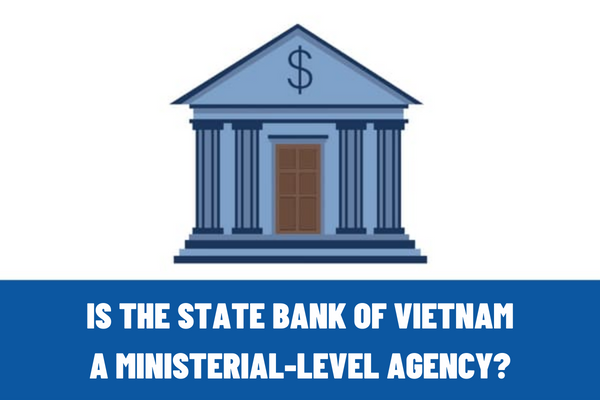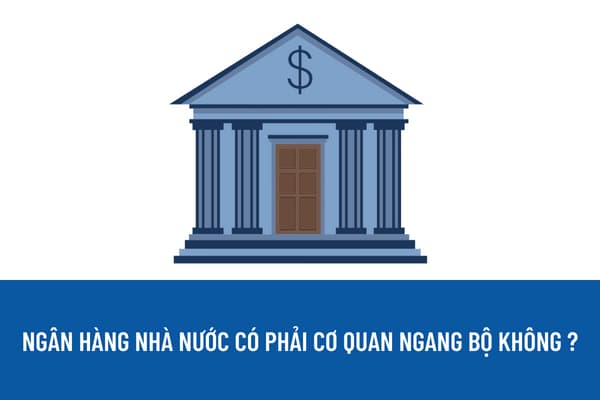Is the State Bank of Vietnam a ministerial-level agency? Can the State Bank of Vietnam use its legal capital to contribute capital for establishing enterprises?
Is the State Bank of Vietnam a ministerial-level agency?
According to the provisions of Article 1 of Decree No. 16/2017/ND-CP on the position and functions of the State Bank of Vietnam as follows:
Position and functions
The State Bank of Vietnam of Vietnam (hereinafter referred to as the State Bank of Vietnam for short) is a ministerial-level agency of the Government, the Central Bank of the Socialist Republic of Vietnam; perform the function of state management of currency, banking activities and foreign exchange; perform the functions of the Central Bank in terms of money issuance, banking of credit institutions and provision of monetary services to the Government; State management of public services under the management of the State Bank of Vietnam.
According to the above provisions, the State Bank is a ministerial-level agency of the Government, is the Central Bank of our country, performing the functions of monetary management, banking and foreign exchange operations, as well as issuing money and providing monetary services.
Is the State Bank of Vietnam a ministerial-level agency? Can the State Bank of Vietnam use its legal capital to contribute capital for establishing enterprises?
Can the State Bank of Vietnam use its legal capital to contribute capital for establishing enterprises?
According to the provisions of Article 4 of the 2010 Law on the State Bank of Vietnam on the tasks and powers of the State Bank of Vietnam as follows:
Tasks and powers of the State Bank of Vietnam
1. To conduct operations for the purpose of currency value stability; to assure the safety for banking operations and the system of credit institutions; to assure the safety and effectiveness of the national payment system; and to contribute to accelerating socio-economic development along the socialist orientation.
2. To participate in the elaboration of national socio-economic development strategies and plans.
3. To elaborate banking development strategies for submission to competent state agencies for approval, and organize the implementation of these strategies.
4. To promulgate or propose competent state agencies to promulgate legal documents on monetary and banking matters; to propagate, disseminate and examine legal documents on monetary and banking matters according to its competence.
5. To determine annual inflation rate targets for submission by the Government to the National Assembly for decision, and organize the realization thereof.
6. To organize, regulate and develop the monetary market.
7. To organize a monetary and banking statistics and forecast system; to publicize monetary and banking information according to law.
8. To organize the printing, minting, preservation and transportation of banknotes and coins: and to conduct operations of issuing, withdrawing, replacing and destroying banknotes and coins.
9. To grant, modify, supplement or revoke establishment and operation licenses of credit institutions, licenses for establishing branches of foreign banks, licenses for establishing representative offices of foreign credit institutions and other foreign organizations with banking operations; lo grant or revoke licenses for provision of intermediary payment services for non-bank institutions; to grant or revoke licenses for provision of credit information services to organizations: to approve the acquisition, sale, division, splitting, consolidation, merger and dissolution of credit institutions according to law.
10. To act as the representative of the state capital portions in enterprises performing its functions and tasks and in credit institutions with state capital according to law; to use its legal capital to contribute capital for establishing special enterprises to perform its functions and tasks under the Prime Minister's decision.
11. To examine, inspect and supervise banks: to handle violations of the monetary and banking laws.
12. To decide on the application of special handling measures to credit institutions which commit severe violations of the monetary and banking law-s or meet with financial difficulties, posing a threat to the safety of the banking system. These measures include purchasing shares from credit institutions; suspending or removing from post managers or executive officers of credit institutions; deciding on the merger, consolidation or dissolution of credit institutions; placing credit institutions under special control; and performing its tasks and powers as prescribed by the law on bankruptcy of credit institutions.
13. To assume the prime responsibility for and coordinate with concerned agencies in. formulating and implementing anti-money laundering policies and plans.
...
Thus, the State Bank of Vietnam is entitled to use its legal capital to contribute capital for establishing special enterprises to perform its functions and tasks under the Prime Minister's decision.
What units does the State Bank of Vietnam consist of?
According to the provisions of Article 3 of Decree No. 16/2017/ND-CP, the State Bank of Vietnam includes the following units:
- Monetary Policy Department.
- Department of Foreign Exchange Management.
- Payment Department.
- Credit Department for economic sectors.
- Department of Forecasting and Statistics.
- Department of International Cooperation.
- Department of Monetary and Financial Stability.
- Internal Audit Department.
- Department of Legal services.
- Department of Finance - Accounting.
- Organize staff.
- Department of Emulation - Commendation.
- Department of Communication.
- Office.
- Information Technology Department.
- Department of Issuance and Treasury.
- Administration Department.
- Department of Transaction.
- Banking Inspection and Supervision Agency.
- Branches in provinces and centrally run cities.
- Institute of Banking Strategy.
- Vietnam National Credit Information Center.
- Banking Times.
- Banking magazine.
- Training school for bank staff.
- Banking Academy.
LawNet
